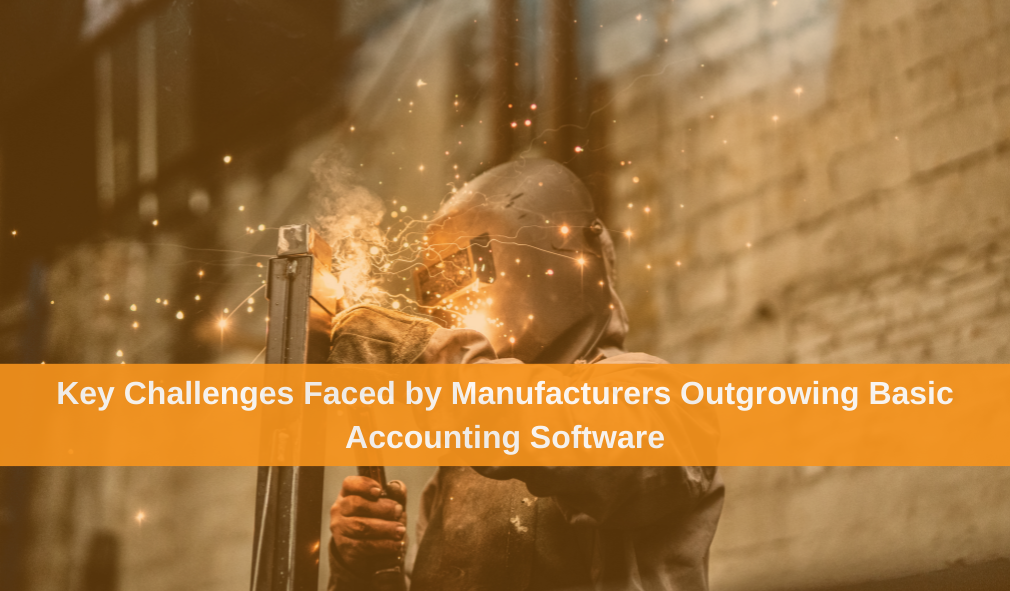As manufacturing businesses scale up, many find themselves outgrowing the small accounting software that served them well in the early days. While tools, like MYOB AccountRight or Xero, are great for startups and small businesses, they can quickly become inadequate for larger, more complex manufacturing operations. This shift can create a series of operational challenges that can hamper growth, reduce efficiency, and increase costs. Below, we explore some of the most common challenges manufacturing businesses face when they outgrow their small accounting software and the impact this can have on day-to-day operations.
1. Limited Inventory Management Capabilities
Small accounting software often lacks robust inventory management tools, which can create significant bottlenecks for manufacturers managing large volumes of raw materials, work-in-progress (WIP), and finished goods. As your business grows, manually tracking inventory levels and stock movements becomes more challenging and prone to errors.
Key issues include:
- Inability to track real-time inventory levels across multiple locations.
- Poor visibility into production schedules, causing delays or overproduction.
- Difficulty in managing inventory turnover rates and ensuring stock availability.
2. Inadequate Production Planning and Scheduling
Effective production planning is essential to meet customer demand, manage resources, and maintain efficient workflows. Small accounting systems, however, often lack advanced features that integrate production schedules with inventory, sales orders, and purchase orders. This lack of coordination can lead to operational inefficiencies.
Challenges include:
- Difficulty in coordinating production schedules with materials availability.
- Over-reliance on manual processes for production forecasting.
- Increased lead times and delays in order fulfillment due to poor planning.
3. Scalability and Performance Issues
As your manufacturing business expands, the volume of transactions, data, and users grows. Small accounting software is typically not designed to handle large data sets or a growing number of users simultaneously, leading to system slowdowns, crashes, and decreased productivity.
Symptoms of this issue:
- The system struggles to process high transaction volumes.
- User log-ins become slow or fail during peak usage times.
- Increased risk of data corruption and system downtime.
4. Lack of Integration with Other Business Systems
In a growing manufacturing business, seamless integration between accounting, inventory management, sales, and procurement systems is critical. Small accounting software often does not support integration with other key business systems, leading to data silos and a lack of real-time visibility across the organisation.
Operational impacts include:
- Data duplication and inconsistency across departments.
- The need for manual data entry, increasing the risk of errors.
- Inability to make data-driven decisions based on real-time information.
5. Inadequate Cost Tracking and Margin Analysis
Manufacturing businesses need precise cost tracking for materials, labor, overhead, and production processes to determine product profitability and make informed pricing decisions. Small accounting software typically lacks the granularity needed for accurate job costing, product margin analysis, and tracking of cost variances.
Challenges include:
- Inability to break down costs by product line or project.
- Difficulty in tracking overhead allocation and determining true production costs.
- Limited reporting capabilities, hindering financial analysis and margin optimization.
6. Complex Compliance and Reporting Requirements
As manufacturing businesses grow, they face increasingly complex regulatory and reporting requirements, such as compliance with industry-specific standards, government regulations, and environmental laws. Small accounting software often lacks the flexibility to handle such demands, making it harder to stay compliant and produce accurate reports.
Common issues faced include:
- Difficulty in generating compliance-related reports.
- Lack of support for multi-currency transactions or global accounting standards.
- Inability to meet regulatory requirements for audit trails or documentation.
7. Manual and Inefficient Processes
When businesses outgrow their accounting software, they often turn to manual workarounds to handle more complex requirements. This reliance on manual processes can slow down operations, increase the risk of errors, and create inefficiencies that cost both time and money.
Examples of inefficiencies:
- Manual data entry for sales orders, invoices, and purchase orders.
- Spreadsheet-based workarounds for inventory and production tracking.
- Delays in financial reporting due to lack of automation.
8. Limited Reporting and Business Intelligence
Small accounting systems often have limited reporting capabilities, which makes it difficult for growing manufacturing businesses to gain insights into their financial and operational performance. As the business scales, access to real-time data and advanced analytics becomes critical to making informed decisions.
Challenges with reporting include:
- Limited access to customized reports specific to manufacturing KPIs.
- No real-time data analytics for key metrics such as production efficiency or cost overruns.
- Inability to create detailed financial forecasts or projections.
Addressing These Challenges: The Case for Cloud ERP Software
When your manufacturing business starts facing these challenges, it’s a sign that you need more than just an accounting system. Cloud Enterprise Resource Planning (ERP) software offers a comprehensive solution, integrating financial management with inventory, production planning, procurement, and more.
An ERP system tailored for manufacturing can offer:
- Real-time inventory tracking and production planning.
- Automation of routine tasks like invoicing and purchase orders.
- Advanced reporting and analytics for better decision-making.
- Full integration across departments for improved communication and collaboration.
- Scalability to grow with your business.
Outgrowing small accounting software is a common milestone for manufacturing businesses experiencing growth. While it presents a series of operational challenges, it also signals an opportunity to streamline processes, improve efficiency, and gain deeper insights into your business operations. Upgrading to a more robust system like an ERP solution can help you overcome these hurdles and position your business for long-term success.
By addressing these key challenges early, you can ensure your manufacturing operations run smoothly, even as your business scales. Discover how your business can tranform your manufacturing operations with a sophiscated and comprehensive cloud ERP solution below.
